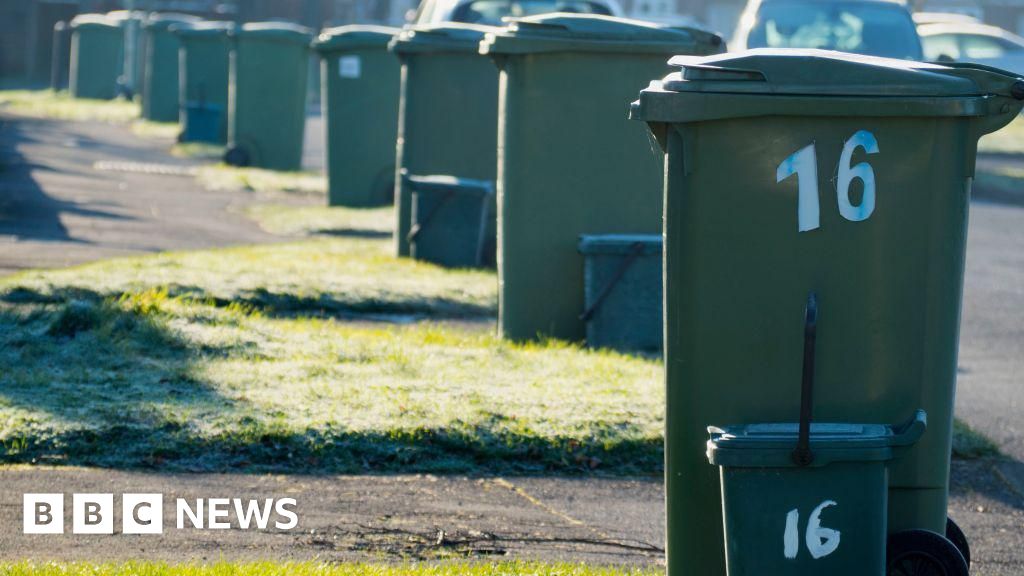World
Could you be fined for putting the wrong things in your bin? – BBC News

Image source, Getty Images
- Author, Megan Bonar
- Role, BBC Scotland News
Scottish homeowners could soon be issued with a fixed-penalty notice if they put the wrong items in their bins under a new law.
The Circular Economy bill, which aims to reduce waste nationwide and grow the green economy, is expected to be passed in Holyrood on Thursday.
The legislation would also ban the disposal of unsold goods, preventing companies from sending products which have not been bought to landfill.
A Scottish government spokesperson said the bill would support the country’s transition to a zero-waste and circular economy.
What is a circular economy?
A circular economy is an economic system aimed at minimizing waste and making the most of resources.
It sees countries moving away from a traditional “make, use, dispose” model of production in favour of a “make, use, remake” one.
The circular economy aims to ensure products, materials, and resources are reused, repaired, refurbished, and recycled for as long as possible.
The key principles of a circular economy include ensuring products are designed in a way that reduces waste and avoids creating pollution, as well as extending the lifecycle of products through reuse, repair, refurbishment and recycling.
This approach aims to create a sustainable economy by reducing environmental impact, conserving resources, and promoting economic growth through innovative business models.
Put simply, a circular economy is like a recycling system for everything.
Instead of throwing things away after using them once, ways to reuse, fix, and recycle products are adopted. This way, less waste is created and fewer new resources are needed, with the aim of helping the environment and saving money.
According to Zero Waste Scotland, “evidence estimates around four-fifths of Scotland’s carbon footprint comes from the products and services we manufacture, use, and throw away.”
Speaking about the bill, a Scottish government spokesperson said: “This is not just good for the environment – it will also create new economic opportunities and green jobs here in Scotland.
“The Circular Economy Bill will support Scotland’s transition to a zero-waste and circular economy, giving ministers and local authorities the tools they need to increase reuse and recycling rates, and modernise and improve waste and recycling services.”
Image source, Getty Images
What is included in the bill?
The bill aims to help turn Scotland into a Circular Economy.
Under the new legislation, local authorities would be granted powers to fine households for putting the incorrect items in their bins.
What items go in what bin can vary by council area but generally green bins are for mixed general waste and blue bins are for recycling.
This means that anyone that puts non-recyclable materials in their blue bins could be hit with a fine.
Car and van drivers could also be fined if anyone is caught littering from their vehicle while local authorities will be given additional enforcement powers, allowing them to crack down on fly-tipping.
The bill would also see charges introduced for single-use items like coffee cups and disposable vapes in an attempt to encourage the use of reusable alternatives.
Single-use plastics are already banned in Scotland, but charges would be implemented for materials such as paper by 2025.
Retailers and manufacturers will also be banned from disposing of unsold goods, preventing companies from sending products to landfills which have not been bought.
The Scottish government said “a proportionate approach will be taken” to this rule, focusing on businesses and products that have the most significant environmental impact in Scotland.
They will also take into account the availability of reuse and recycling as alternatives to destruction.
In France, clothing, cosmetics, hygiene products and electrical items as priorities for restrictions.
The government is said to be exploring options such as implementing a requirement for producers to producers to “take their products back and manage them once used”, according to the Scottish Environment Link.
Also included in the bill are ministerial powers to set local recycling targets and a requirement to publish or refresh a circular economy strategy at least every five years.
According to the Circularity Gap Report in 2022, Scotland’s economy was only 1.3% circular, meaning it almost completely relied on new or virgin materials.
The Association for the Protection of Rural Scotland (APRS) has said 27% of people in Scotland favour making producers primarily responsible for the costs of recycling or disposing of products once they are no longer in use.
Director Kat Jones said: “A requirement on producers to take them back once used would change the whole wasteful system.
“This principle could eventually apply to everything we buy and use.
“We can’t get there overnight, but these proposals could see the beginning of the end for our single-use economy, with some of the most damaging and wasteful products being first in line for change.”
However, some critics have said the legislation doesn’t go far enough and there are concerns about the cost of implementing the new rules.
It is estimated that it would cost the Scottish government £1.6m over three years to implement the primary legislation.
The cost to each local authority over the same period would be just over £200,000.


